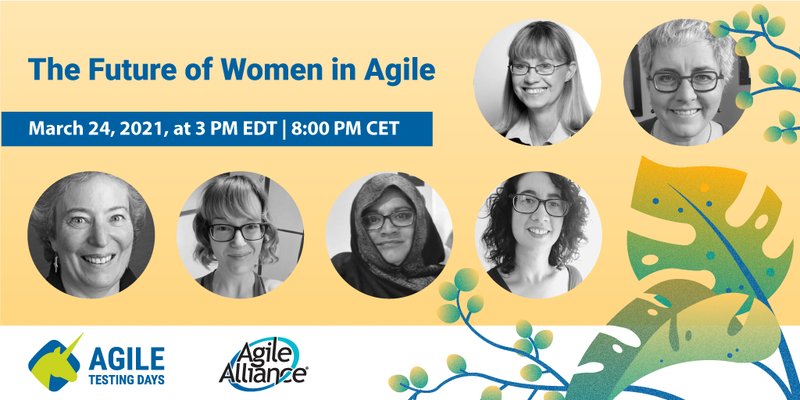
Virtual Panel Discussion – The Role of Women in Agile in different Times and Cultures
In March 2021, I had the privilege of cohosting a panel discussion with Ellen Grove. The discussion was sponsored by Agile Testing Days put on by Trendig in Germany and the Agile Alliance. The participants were Alex Schladebeck, CEO at Bredex, Germany, Faiza Yousuf, cofounder Women in TechPK, in Karachi, Pakistan, Claudia Badell, co-founder of TestingUY conference in Uruguay, and owner of Jigso Labs and Johanna Rothman, author of multiple books in testing, product management and leadership management.
The panel started with a discussion around leadership, and the challenges that they had, and some of the people that helped them along the way. It continued with a discussion about culture and how changing from one culture to another affected or challenged them. The final section was how we could encourage new leaders.
Alex started out the conversation sharing her background in linguistics, and how people have helped her along the way. From the person who believed in her and brought her into IT, to Pepe who believed in her and gave her opportunity at Agile Testing Days to grow her speaking abilities. So much support from people in her communities. And underlying all of that was how important it was for her to have a growth mindset.
Faiza explained how she started a movement. She didn’t mean to. It “just” happened. It started with attendance in an entrepreneurial program with 50 women from different backgrounds and she realized there is strength in numbers. She learned how to create a community, engage with people, make sure aligned towards a goal.
Claudia explained how everything in her life is about sharing and helping to start the TestingUY which is one of the major testing conferences in South America, sharing her knowledge from her both her teaching and technical background to make it a success.
Johanna said that for her, the real driver is about learning and about fun. She believes that people who have different types of experiences tend to be a more well-rounded leaders, so we need to learn how to take our current and past experiences and move them forward. As well, not be afraid to fail… and try new things. Not afraid to be vulnerable … we’re human. I loved the term she used “Embrace the messiness of being human”.
In all of these stories, the panelists moved from one culture to another - from dev to tester, from individual contributor to manager, moving to different countries, from working in-house to remote, or even moving from local to international. We wanted to know what the panelists noticed when they moved from culture to culture, what they took with them on their travels, and what they would pass on to others.
Alex mentioned that she spent a lot of time thinking / wondering about how she was perceived, how could she interact with people. Being able to express herself in different languages meant she could try to be able to express. That was important to her because she works hard to be authentic. Another thing she’s taken is the ability to ask herself “Is this actually rude or is how I am perceiving it.” She tries to think of at least 2 other reasons why a person might be saying. Being aware of others around her and how they act / react.
Faiza wanted a space for women to come together in safety but it was a huge cultural jump from contributor to an entrepreneur. As an introvert, she has a hard time interacting in real time, but she found she was more open in virtual spaces and has learned how to adopt the virtual area. She’s also learned the best thing to do when meeting people is to listen to them – it helps to learn about the people and what they find important. Working with people who have different ideals and finding the common thread.
To Claudia, it was about trusting in yourself and other things are easy to come. For example, English is hard for hard for her - hard to express everything she wants to. At the beginning, it will be messy, but it will come. She trusts herself and not be afraid to make mistakes. Know that the other person you are working with has their own struggles – so be sympathetic. Communication enables collaboration and it is a way of enhancing everything – team, company…
There is a thread running here; being successful is about: listening, being authentic, trust, having confidence in ourselves and being able to talk about ourselves in a positive manner (even if we are challenged with that). We asked Johanna about how she’s seen things change over time to make these things easier.
Johanna’s first comment said her obliviousness has helped her, but she doesn’t have to be oblivious to idiocy anymore. One thing that hasn’t’ changed, is she still sees mostly men in the leadership teams. She then talked about how to bring our self-confidence to help us be in a position of strength. As long as we come from a position of strength then we can ask for help, and we can contribute with confidence.
Empowering Women as Leaders
The last section of the discussion was about how we can grow more leaders – especially women. A good way to start - from a position of strength.
- Having sessions like this.
- Being active in our communities, inspire others.
- Helping others to learn to share their knowledge, preparing proposals, being a speaker – a great learning process.
- From a work perspective – be open to promote spaces for other. We can grow if we have the space to grow… supporting people in our teams. Promoting others – helping them to step forward.
- Make a connection with others and mentor – help them to step out of their current environment.
- Connect women to others in tech, uplifting them, connecting them to the right person - it can change trajectories for some women.
- Be a role model - keynoting at conferences.
- Be the person with pink hair – show that you can be yourself and let others see.
- The idea of sponsoring – speaking for others.
- Catching your own biases… product of the system.
- Have a network because so you don’t have to fight the fight alone.
- Find your writing voice. Share, so more people can be part of your experience.
____________________________________________
Q & A
1. What homework would you give your younger self?
Alex Schladebeck:
Doubt yourself less.
Johanna Rothman:
Use more experimentation. It enables you to learn fast.
Ellen Grove:
Reframe as experiments when you are trying new things. It gives yourself permission to try and fail and see what happens.
Faiza Yousuf:
Read more … especially fiction. It helps you to understand people better. I used to do a lot academic, but now read a lot of fantasy.
2. When did people finally listen to you? – the pivotal moment when they started to listen
Johanna Rothman:
Power and responsibility of leadership.
Claudia Badell:
I was 5 years old in primary school. A situation was handled poorly, and I told my mother. I asked her how she would handle it. We went to the school and we talked to the director … I felt listened to. Trust in yourself and support from the people who surround you.
Alex Schladebeck:
If my message is not getting through, then sometimes bring in someone else.
Faiza Yousuf:
The things that I say when people came back with questions or asked me to work on something. We needed a digital forum for women in tech and somone told me, why don’t you pick up that? That person heard and listened and supported me to make it work.
Janet Gregory:
The first time someone quoted me in a tweet.
Ellen Grove:
The first time someone came to me in a conference and when someone said they saw me in a video and now have questions.
Voices from the chat to this question
Very strong women over generations that are role models for others. Go out, speak, tell your history. It is worth to be told. Take the space you need.
Working remote helps a lot in finding out about own authenticity. I can be more focused and not be attracted or influenced by all the noise going on in an office.
Less external expectations when I'm remote.
Seeing people like Janet and Lisa and Elizabeth Hendrickson at my first conferences. Great role models.
3. How can we assure men that its safe to have women leaders around them?
Janet Gregory:
I think this will depend on the culture around them – both country, organization and their own personal family. Personally, I have found it best to be open and honest without trying to play games. I have found that to work for me. One of the areas where I had to work hard at was my communication skills – I didn’t want to act “like one of the men”, but also realized that they didn’t get the nuances so I learned to speak out and speak directly. If I wanted something, I made it clear. I didn’t always succeed, but it is a continual growth.
4. What if it is the woman who is causing the problem - growing their career in a man's world and feeling that they had to act like "one of the guys" to fit in and move up?
Janet Gregory:
Twenty years ago, I think women felt they had to act like ‘one of the guys’ to get ahead. They had to think like a man. Unless it affects me directly or the company I work for, I figure people can do what they want how they want. Sometimes, it is a persona they put on to make them feel more comfortable. Sometime, it is just how they are. However, if they ask my advice, I might explain why I don’t think it is necessary and point them to articles that explain why. do have issues with women (or men) that backstab people to get ahead and I have met some of those over the years, but that is a different question.
____________________________________________
I have written a second post about my thoughts on some matters that were discussed in the panel. In the post I describe how I can apply some of the learnings from the discussion to the way I live my life and interact with the people around me.
You can find the post here.
➡️ Watch the full video in the AgileTD YouTube channel and just click below.
Author Janet Gregory
Janet Gregory is an agile testing coach and process consultant with DragonFire Inc. She is the co-author with Lisa Crispin of two Ag…




